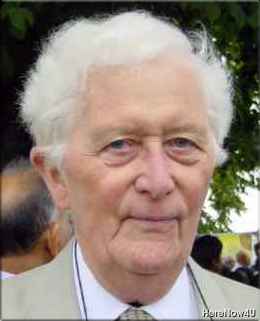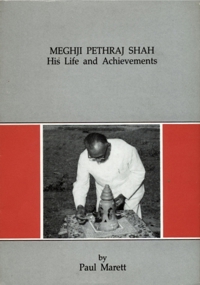
On 2nd November 1955 Meghjibhai had the honour of entertaining the Prime Minister of India, Pandit Jawaharlal Nehru, at his home. The Prime Minister's plane stopped over at Jamnagar airport en route for London. Dhebarbhai and Morarjibhai Desai met the plane and escorted Pandit Nehru to Meghjibhai's house. The Prime Minister was accompanied by his daughter, Indira. Nobody knew at that time, of course, that not only the present but also two future Prime Ministers were being entertained at Meghjibhai's house. The future was unknown: on this occasion the household of Meghji Pethraj Shah was overjoyed to receive the distinguished and much-loved leader of India. When the time came for the Prime Minister to leave, Meghjibhai handed him an envelope. Wanting, naturally, to know what was in the envelope, whether it might be some complaint or perhaps a new plan from his host' s fertile brain, Pandit Nehru opened the envelope then and there. He was astonished and delighted when he saw that it contained a cheque for one hundred thousand rupees as a donation from Meghjibhai to the Kamla Nehru Memorial Hospital, Allahabad, U.P., (the home town of Pandit Nehru). Both the Prime Minister and his daughter expressed unreservedly their gratitude to this munificent benefactor from Saurashtra.
Naturally enough, as a son of Saurashtra, with close links to the region of his birth, Meghjibhai was first of all attracted to helping the modernisation of his state. He knew the region and its people well and could appreciate their needs. More donations followed. As already mentioned, four hundred thousand rupees ensured the establishment of a hospital for lepers at Bhavnagar. Eighty-five thousand rupees set up a kindergarten in Rajkot, another four hundred thousand rupees went to public libraries in the villages and primary school buildings which were being erected in many places in Halar district.
Having first satisfied the most urgent needs of Halar district he next turned his attention to the district of Zalawad. After consultation with Rasikbhai Parikh, the Chief Minister, and Manubhai Shah (who came from that district), he announced that he was going to give a quarter of a million rupees, against a similar sum from the government of Saurashtra, to set up a college of arts and science in Surendranagar. The ruler, the Thakor Saheb, of Wadhwan generously donated the land on which the college was to be built. There was a great need for an institution of higher education in Zalawad: until the new college was founded students had to travel to Rajkot, Bhavnagar or Junagadh, and many promising boys and girls were deprived of the opportunity of higher education by the cost and difficulty. Surendranagar was well placed for students who came from Wadhwan, Limbdi, Dhrangandra, HaIwad, Sayla and indeed many other places in the area.
The news of the new college was received with great enthusiasm throughout Zalawad. His Highness the Maharaja, Governor of the State of Saurashtra, was present at the ceremony of laying the foundation stone of the college building, and the Chief Minister, Rasikbhai Parikh, presided over the function. Meghjibhai's generosity was officially recognised by the presentation to him of testimonials of honour from each of the municipalities of Surendranagar and Wadhwan.
During these years Meghjibhai came into contact with many people who were anxious to serve the community and he found himself impressed by their spirit of service and sincerity. Enthusiasm for education was growing in Surendranagar and in 1958 this resulted in the establishment of the Surendranagar Education Society to promote education in the area. Meghjibhai's sympathies were aroused and when he visited Surendranagar again in 1960 he met Shri Mansukhbhai Doshi, Secretary of Surendranagar Mitramandal and certain representatives from Bombay. Together they discussed plans for a number of new institutions. At the close of the discussion Meghjibhai announced plans which would involve donations by him totalling 300,000 rupees. He gave 100,000 rupees towards the establishment of the M.P. Shah Commerce College, on the understanding that the government would contribute 150,000 rupees and 50,000 rupees would be raised from the general public. In Wadhwan, a charitable body, the Vikas Vidyalaya, was to receive similar sums for the establishment of the Maniben M.P. Shah Mahila College. Meghjibhai's generosity made a great impression in Surendranagar and he, together with Maniben, was received with honour by Vikas Vidyalaya and other institutions. The example of Meghjibhai's concern and generosity stimulated philanthropic activities in Zalawad. Many were motivated to co-operate in the new ventures and other rich people of the region were inspired to donate generously. Meghjibhai himself kept in touch regularly by correspondence with those working on social projects and with public institutions, even when abroad. He kept himself informed of their activities and gave them the benefit of his guidance. One particular field of effort impressed him, the work of Pushpaben Mehta and Aruna Desai for the improvement of the position of women. His next visit to Surendranagar-Wadhwan came two and a half years later, in October 1962. His donations on this occasion amounted to over a third of a million rupees. For example, Vikas Vidyalaya of Wadhwan was to receive 25,000 rupees a year for ten years, and, fifty thousand rupees went to Surendranagar Medical Relief Mandal to set up a nurses' training college.
It was at this time that Meghjibhai' s approach to charitable donations changed. He did not know Surendranagar too well and he thus tended now to look into the sincerity of those who were involved in the service of their fellows. Not cold logistical planning but human warmth and service impressed him. It upset him that institutions performing valuable work found it difficult to make ends meet and had to come cap in hand to wealthy people in order to support the workers. He saw the problems and difficulties of the managers of Vikas Vidyalaya and the orphanage, which it ran and his heart was touched. Those ladies who put their time and energy faithfully into efforts to shelter ignorant and miserable women and make them self-sufficient, had to beg for the charity of the wealthy in order to keep the project afloat. Surely it is the duty of society as a whole to support and help such institutions. He was deeply disturbed by such thoughts.
He was upset at the fact that the promises given by the Government were not fully kept. He expressed his feelings strongly at a function held in the women's college.
'I promised to donate one lakh of rupees to build a college for women. Against that amount the government also promised to contribute one lakh of rupees. But, up to now, that promise has not been kept. My heart is deeply grieved at this and I hope that the government will remember its promise. I have come here today on my return from England after two years and eight months and I have to say with regret that the government has reneged on its promises. If the government itself does not keep its promises it puts ordinary people like myself in difficulty.'
He gave utterance to his feelings quite frankly. Meghjibhai was not the sort of person who would hand over a donation and then forget about it: he wanted to see the institution with which his name and money were associated progressing steadily.
The orphanage and the Vikas Vidyalaya were suffering from a deficit each year. The managers were hesitant to approach Meghjibhai about this but at last did bring it to his notice and with some trepidation they asked him for a few thousand rupees to meet the current loss. The managers were taken aback when Meghjibhai said bluntly, 'I shall not pay that amount'. He asked them, 'If your loss is paid this year, what will you do in subsequent years? The loss will just keep on recurring.' They were very upset. They did not understand what he was really suggesting. He really meant that they should have asked for an amount sufficient to last for eight or ten years. Their disappointment turned to joy when he made this clear to them and he agreed willingly to help them for up to ten years. The managers were dumbfounded. To meet a donor who took this attitude was a completely new experience for them. They truly believed that Meghjibhai's wealth was limitless but they never dreamed that his generosity was unlimited. They compared him to Kuber, the treasurer of God, whose gifts enabled the recipients to realise their own potential.
 Dr. Paul Marett
Dr. Paul Marett

